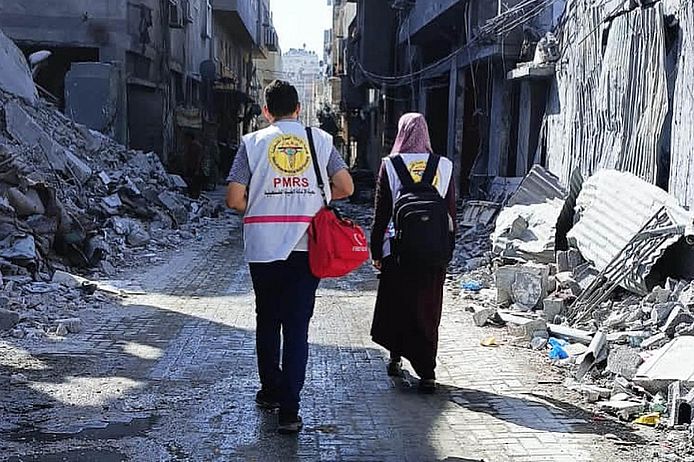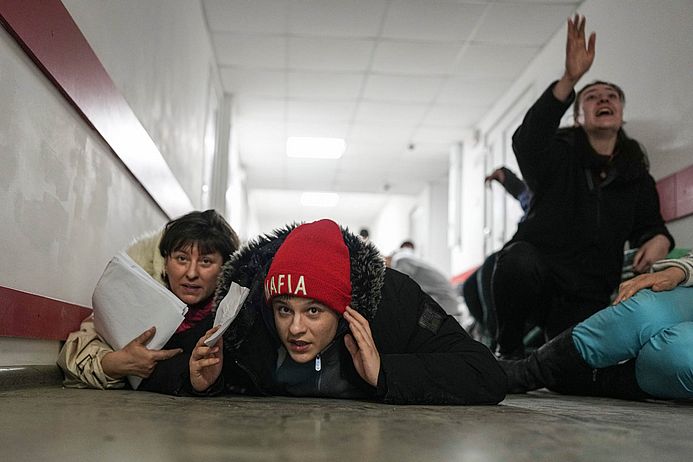Back in December 2023, when the Israeli war in Gaza was only a few weeks old, Tlaleng Mofokeng, the UN Special Rapporteur on the right to health, condemned the "merciless and unrelenting war" against hospitals and medical staff. In vain. At the beginning of April, the largest health facility in the Gaza Strip was also destroyed in a military operation conducted at the site of Al-Shifa hospital. In the wake of seven months of war, the health infrastructure for 2.3 million people lies in ruins, including facilities run by medico's partner organisation Palestinian Medical Relief Society, such as its centre for non-communicable diseases. Over 500 health workers have been killed so far - more than twice as many as the worldwide figure for 2022. The escalating military violence in Gaza is only the culmination of a development in which medical infrastructure itself is becoming a target.
Medical facilities and healthcare workers in war actually are afforded comprehensive protection under international law. It all began with the founding of the International Committee of the Red Cross in 1863. Citing the Hippocratic Oath, the aim was to turn the claim of being able to treat sick and wounded combatants of any warring party into a reality. In 1949, in the wake of two world wars, the international community in Geneva agreed on comprehensive humanitarian standards that would also protect the civilian population in times of war. Under Article 18 of the Geneva Convention, healthcare facilities "shall under no circumstances be attacked, but shall at all times be respected and protected by the parties to the conflict". This applies regardless of whether targeted military operations or indiscriminate shelling are involved.
Medical assistance as a criminal offence
The Geneva Convention has never de facto fully protected healthcare facilities. The intensity of attacks has increased immensely over the last 15 years, however. Annual reports issued by Safeguarding Health in Conflict Coalition (SHCC) - in which medico's long-standing partner organisation Physicians for Human Rights Israel is a member - documented almost 2,000 attacks against healthcare facilities and their staff in 2022 alone, more than ever before. The report relates accounts of doctors in Myanmar and Iran who have been imprisoned and even murdered for treating people in need. It documents the mistreatment of health workers in Afghanistan. It recalls the murder of aid workers in Pakistan whose only offence was to have vaccinated children against infectious diseases. And it reports more than 700 military strikes by Russia against the Ukrainian healthcare system. With the war in Gaza, these numbers will rise massively again in the next report.
The massacre of Mullivaikkal in Sri Lanka's civil war in 2009 is cited as an example of heinous war crimes being committed despite and in contravention of the Geneva Convention. Within the space of a few months, more than 40,000 people surrounded on a narrow coastal strip were killed there. Shelling from the land, sea and air also targeted health facilities in particular. To justify this warfare, the government at the time employed a euphemism that the USA had coined in its response to the attacks of 11 September 2001: it said the country was carrying out a "war on terror". This not only eliminates the distinction between civilians warranting protection and military opponents in military conflicts. The narrative degrades the other side from a warring party entitled to certain rights to an enemy that is to be wiped out, an indiscriminate evil. In line with this logic, the Sinhalese government regarded the entire Tamil population - regardless of whether they were civilians or Tamil Tiger fighters - as terrorists. They got away with it: The international community let the military's actions slide.
A blueprint massacre
According to Saman Zia-Zarifi, international director of Physicians for Human Rights, this event has served as a blueprint. On the eve of the Syrian civil war, the regime defined all areas under the control of the opposition and therefore all people present in these areas as terrorists - and hence legitimate military targets. This manifested itself in airstrikes on civilian areas, including the targeted bombing of healthcare facilities. With Russia's entry into the war at the end of 2015, the frequency and scale of attacks on healthcare facilities intensified on an unprecedented scale. Turkey is also constantly portraying its strikes on self-governing northern Syria as a legitimate fight against Kurdish terrorism - with direct consequences for the conduct of the war. Most of the hospitals run by medico's partner organisation, the Kurdish Red Crescent, have now been destroyed or damaged in airstrikes. Similar mechanisms have been used in practically every war in recent years, be it in South Sudan, Yemen or Afghanistan, where the US army destroyed the hospital of Médecins Sans Frontières in Kunduz in 2015.
As a result of this development, the UN Security Council set an example in 2016, reaffirming special protection status: in Resolution 2286, which was adopted unanimously, attacks on healthcare facilities are branded as alleged war crimes. It calls for an end to impunity for those responsible. But this has changed nothing. On the contrary: The Russian army repeated this tried-and-tested strategy in Syria during its invasion of Ukraine at the end of February 2022. The Russian government justified the destruction of the maternity clinic in Mariupol in March 2022 by claiming that fighters from a Ukrainian battalion had taken up position there. The Israeli government has been exploiting the same argument to justify the destruction of medical facilities in Gaza for years.

In their actions, warring parties claim an exception to the Geneva Convention. According to this ploy, healthcare facilities lose their protected status as soon as they are "used for acts detrimental to the enemy outside their humanitarian role". This means that if hospitals are part of the enemy's military infrastructure, they are no longer taboo zones under international law. There are strict requirements for this, however. For an attack to be lawful, for example, it must be demonstrated that everything possible has been done to minimise harm to patients and medical staff. Attacks that are expected to cause harm to the civilian population that would be deemed to be excessive in relation to the expected concrete and direct military advantage are considered war crimes. But such "small print" is of little interest. Whether it was the storming and shelling of the Al-Shifa hospital or the numerous civilian casualties - the Israeli government justified it all by claiming that the hospital had served as a weapons depot and refuge for Hamas fighters, without, however, providing sufficient evidence.
In recent wars, the destruction wrought to healthcare infrastructures has been far more than just collateral damage. The medical journal The Lancet spoke of a "weaponisation of health care" as far back as in 2016. This denotes the strategy of using people's urgent need for healthcare as a weapon against them by forcibly depriving them of it and attacking places where healthcare is provided. And so the attacks on healthcare professionals also kill and wound those who bear personal witness to it all through their work. Twitter and TikTok are replete with reports by doctors on the suffering of war. Hospital directors are important dialogue partners for the press. Backed by the legitimacy of their profession, they all reaffirm the universality of the human right to life and health. This also makes their testimony dangerous for aggressors. At the very beginning of the protests in Syria in 2011, a law was passed under which specifically doctors treating wounded protesters were to be charged with a criminal offense. Arrests, torture and public executions followed, and tens of thousands of well-trained professionals left the country.
One objective: demoralisation
Above all, however, this unbridled warfare is aimed at attrition and demoralisation. Treatment of the wounded, containment of infectious diseases or therapy of psychological trauma: an intact healthcare system would also have to cope with enormous war-related burdens. Even during war, children are born, diabetics need insulin and kidney patients need dialysis. Therefore, a breakdown in healthcare means immediate suffering for tens of thousands of civilians. This has a profound effect on the psyche. Medical treatment offers the prospect of healing. Their protection under international law makes hospitals supposedly safe havens. So it is no coincidence that thousands sought shelter in a tent city on the grounds of the Al-Shifa hospital. By reducing all this to rubble, all hope is destroyed as well.
The consequences of these military strategies are deadly - immediately, because injuries and illnesses cannot be treated, but also in the long term. Even before October 2023, the average life expectancy in Gaza was ten years lower than in Israel. This will decline precipitously as a result of the war. And even if the medical infrastructure is rebuilt one day, the doctors, surgeons, paramedics and nurses who have been killed or who have fled cannot be easily replaced. This creates dependencies on donor countries and aid organisations, but also on the local government - making healthcare a powerful instrument of control for occupying powers, for example.
Sri Lanka, Syria, Ukraine and Gaza are just the most prominent examples of the erosion of the importance of international law. The principle of "your enemy's doctor is not your enemy", which humanitarian organisations such as Médecins Sans Frontières have repeatedly cited, demanding that it be respected, no longer applies. In the words of WHO spokesperson Margaret Harris: "It would appear that the world has lost its moral compass." In order to restore the proper focus, alleged war crimes need to be resolutely investigated by the courts. This is precisely what UN Security Council Resolution 2286 calls for. So far, however, not a single indictment has been brought before the International Criminal Court.


